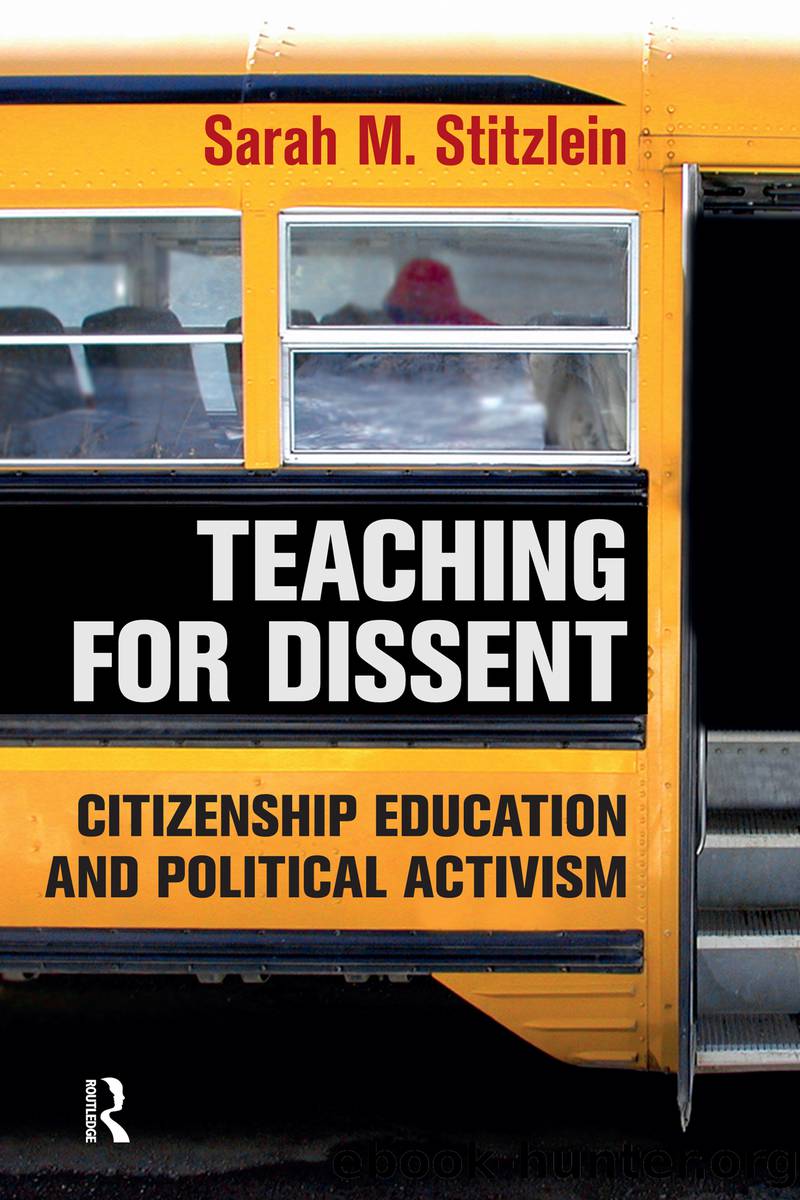Teaching for Dissent by Stitzlein Sarah Marie;

Author:Stitzlein, Sarah Marie;
Language: eng
Format: epub
Publisher: Taylor & Francis Group
Published: 2016-08-15T00:00:00+00:00
Not only did this teacher feel that the tests had been imposed by nonspecialists, she also felt that no one in power would respond to the harm she believed these tests caused in her classroom. As evidenced in our interviews with other teachers, this teacher is one of many who have witnessed harm to exhausted and over-tested children, relinquished comprehensive and intriguing curriculum units in order to more directly cover test content, and questioned the significance of his or her role in the changing school setting.15
Many of the teacher interviews revolved around an issue they believed to be particularly jeopardized by the current political climate: professionalism. One aspect of professionalism is professional accountability, where teachers are held accountable to their peers who establish ethical and performance standards. Such professional accountability is evident in the medical boards established by doctors and the bar established by lawyers. NCLB strips teachers of this professional accountability and prevents them not only from critiquing one another in constructive ways, but also from critiquing NCLB as a whole. Their respected professional stance is diminished, so they have no perspective from which to publicly voice dissent in a way that would be noteworthy, such as the public stance taken by doctors via the American Medical Association when they used their specialized knowledge to put forward a response to proposed health care reform.16 Additionally, over-reliance on high-stakes testing scores overlooks knowledge of factors influencing performance that teachers know about. Such over-reliance tells teachers that it is the score, and not their knowledge, that matters to the worldâfurther curtailing their motivation or ability to dissent.
Rather than punitive strategies, restorative and constructive strategies are needed to improve schools. If a test is designed well and its aims are realistic, a poor score can tell us that something is wrong, but when a large proportion of students in a given school do poorly, the score alone will not tell us, precisely, what is wrong. Just as democracy requires continual renewal through rebuilding and restorative strategies, so does the success of educational policies within a democracy. Rebuilding and renewal come about through dissentâthrough presenting new and different ideas about how to best achieve a desired end or to propose a different goal. Teachers can tell us what is wrong, but we need to give them a space to share this information, even if it runs counter to the dictates of accountability policies. When teachers possess experiences and knowledge that could dramatically affect educational policies and yet do not or cannot express them, especially in venues that truly listen to teacher input, we need to consider how dissent can be employed in such a way as to simultaneously effectively activate teachers, integrate teachers' perspectives into policy debate, and foster an appreciation for democracy among students.
Download
This site does not store any files on its server. We only index and link to content provided by other sites. Please contact the content providers to delete copyright contents if any and email us, we'll remove relevant links or contents immediately.
The Secret History by Donna Tartt(18161)
The Social Justice Warrior Handbook by Lisa De Pasquale(11953)
Thirteen Reasons Why by Jay Asher(8451)
This Is How You Lose Her by Junot Diaz(6438)
Weapons of Math Destruction by Cathy O'Neil(5829)
Zero to One by Peter Thiel(5490)
Beartown by Fredrik Backman(5357)
The Myth of the Strong Leader by Archie Brown(5238)
The Fire Next Time by James Baldwin(5016)
How Democracies Die by Steven Levitsky & Daniel Ziblatt(4958)
Promise Me, Dad by Joe Biden(4908)
Stone's Rules by Roger Stone(4857)
100 Deadly Skills by Clint Emerson(4691)
A Higher Loyalty: Truth, Lies, and Leadership by James Comey(4550)
Rise and Kill First by Ronen Bergman(4545)
Secrecy World by Jake Bernstein(4388)
The David Icke Guide to the Global Conspiracy (and how to end it) by David Icke(4380)
The Farm by Tom Rob Smith(4323)
The Doomsday Machine by Daniel Ellsberg(4245)
